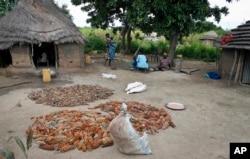Nearly 7 million people in South Sudan could face acute food insecurity at the height of the May-June lean season, according to three United Nations agencies and the government.
The U.N. Food and Agriculture Organization (FAO), the World Food Program, UNICEF and the government released a report Friday indicating the number of acutely food insecure South Sudanese has increased by 13 percent since January 2018.
Isiah Chol Aruai, chairman of South Sudan's National Bureau of Statistics, said fighting in parts of the country continues to disrupt food production, deplete livestock and hinder people's access to food sources like fish, livestock, and wild foods.
"Food scarcity at household level has led to severe asset depletion as people try to raise income to purchase food. Even as they do this, the ongoing economic crisis has significantly reduced their purchasing power, particularly the most vulnerable populations who rely on purchasing highly priced foods from markets," said Aruai.
The report says some 30,000 people in Jonglei and Lakes states are already experiencing extreme food insecurity. That's called the "catastrophe phase" or IPC5.
Cumulative drivers
The report documents how food insecurity has been driven by the cumulative effects of South Sudan's conflict, which displaced some 4.5 million people.
Cereal production this year will only meet slightly over half of the country's needs, according to Simon Cammelbeeck, the WFP's Acting Country Director in South Sudan.
He said the WFP plans to preposition 175,000 tons of food in more than 60 warehouses ahead of the rainy season to reduce delivery costs.
"WFP will provide the most vulnerable people with a variety of support including life-saving food and cash distributions in areas where markets are working," he said Friday.
But he predicted the humanitarian situation will get worse as more refugees and internally displaced persons return to their homes.
Pierre Vauthier, the FAO representative in South Sudan, said her agency will provide seeds and fishing equipment to help returnees "by giving the means to the farmers, the fishermen, livestock keepers, to produce their own food, to generate their own market," said Vauthier.
Andrea Suley, UNICEF Country Representative for South Sudan, said the revitalized peace deal signed last year will give her agency a chance to reach out to more children than what the children's agency was able to do during the height of the fighting.
"UNICEF and partners expect some 860,000 children across South Sudan to be acutely malnourished in 2019; that is almost twice the number of people living in Juba. Thirty percent of these children will be severely malnourished with a high risk of dying," said Suley.
Bureaucratic delays
Andrea Noyes, deputy head of the U.N. Office for the Coordination of Humanitarian Affairs in South Sudan, said all the required paperwork and bureaucratic impediments aid groups endure delay emergency support to those most in need.
"To prevent more people from slipping into catastrophic conditions, humanitarian organizations need predictable assistance access across the country. The revitalized peace agreement offers us hope and improved access conditions," said Noyes.
But she warned there are still many parts of the country, like the southern town of Yei, where insecurity prevents aid groups from delivering life-saving services and food.
In recent week, tens of thousands of South Sudanese have fled the Yei area, where villagers say that armed forces have killed civilians, raped women, and burned entire villages.






